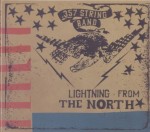.357 String Band – Lightning From The North (Music Review)

.357 String Band - Lightning From The North
One common approach for alt country bands is to mix traditional instrumentation with punk-influenced vocals. I’m sure that many people who could otherwise see this music as a reverent, skilled alternative to modern pop country are too put off by the rough singing to appreciate it, and I’ve wondered how this contributes to the divides within country music. Personally, though, I’m a fan of that sound. The aggressive singing is a battle cry for bands trying to reclaim a musical heritage that has been watered down by mainstream expectations, and if this sub-genre has run too far from the wholesome, moral side of country, well, I’m the wrong person to complain to about murder ballads and outlaw songs.
.357 String Band is a perfect example of this style, with their main distinction being their focus on bluegrass instead of more general country. (They call their sound “streetgrass”, but I don’t know that a new term is needed for it.) The members are very skilled country musicians, whose playing adds a lot of complexity to the traditional bluegrass sounds, and with production that retains the energy and layers that most classic bluegrass recordings sadly lose. The lyrics are unmistakably country when considered song-by-song, though very few classic singers would have included so many songs being no-good troublemakers without a few gospel songs for balance. But the singing, of course, is where the band would lose most traditionalists.
I have mixed feelings about the singing on Lightning From The North. Some songs are perfect examples of why this punk approach can mix so naturally with country – witness the authenticity it gives to the hard-partying life in “Dust Devil”, or the world-weariness it brings to the more tender “The Days Engrave”. In many other songs, though, the vocals fall a little flat. The singer seems more intent on hitting all the words at the right time and getting through the song than with actually portraying the emotions that should be behind it. “The Harvest Is Past”, for example, laments social decline (“thieves and beggars prosper while good men wither and die”) with all the subtlety of a high schooler who has been called on to read Shakespeare to his English class, This album features two singers, with the good performances generally coming from Joe Huber, and the weaker ones from Derek Dunn. Both singers have their shares of successes and failures, though. Whether this is from the punk influence on modern country, or the fact that bluegrass music traditionally pushes its performers to stay fast and upbeat on all songs, the band would be a lot better if they would slow down and emote at times.
Lightning From The North is an occasionally uneven, but usually good, collection of songs. It finds a surprising amount of variety in bluegrass, a style that often sounds the same on the downbeat songs as the upbeat ones. My concerns about the singing aside, this is a solid entry in a style that is all too rare among alt country bands.
Grade: B
For the most part, I agree with your critisizm. I do believe Joe Huber has the better voice of the two. his songs are deeper and make you think. Much like a bluegrass or “streetgrass” Dylan. Derek Dunn is more of a “in your face” kind of singer. He has a point to be made and he makes it. There is certainly something to be said about that.
357 will alway live a happy and peacful life among the greats of the underground movement. Joe is doing his own thing now and I think derek is well on his way to do the same, Jayke has a great cd out there too… these guys are true to the art and it pours out of them whether they want it to or not.